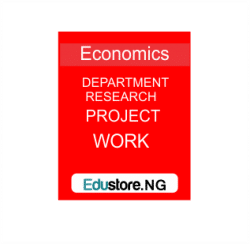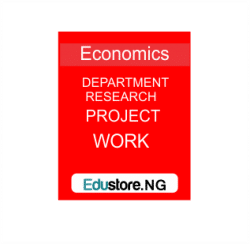ABSTRACT
This study is on real sector output and economic growth in Nigeria. The total population for the study is 200 staff of CBN, Uyo, Akwa Ibom state. The researcher used questionnaires as the instrument for the data collection. Descriptive Survey research design was adopted for this study. A total of 133 respondents made human resource managers, customer care officers, senior staff and junior staff were used for the study. The data collected were presented in tables and analyzed using simple percentages and frequencies
CHAPTER ONE
INTRODUCTION
- Background of the study
The real sector is where goods and services are produced through the combined utilization of raw materials and other production factors such as labour, land and capital. It therefore forms the main driving force of any economy, and the engine of economic growth and development. The real sector comprises agriculture, industry, building and construction, and services. Agriculture can be further broken into crop production, livestock, forestry and fishing, while industry comprises crude petroleum & mineral gas, solid minerals and manufacturing. Services are made up of transportation, communication, utilities, real estate & business service, education and health.( pdfs.semanticscholar.org)
The sector is important for a lot of reasons. First, the sector produces and distributes the tangible goods and services required to satisfy aggregate demand in the economy. Its performance is a gauge or an indirect measure of the standard of living of the people. Second, the performance of the sector can be used to assess the effectiveness of macroeconomic policies. Government policies can only be adjudged successful if they impact positively on the production and distribution of goods and services and therefore raise the welfare of the citizenry. Third, a vibrant real sector, particularly the agricultural and manufacturing activities, create more linkages in the economy than any other sector and thus would reduce the economic pressures on the external sector. Fourth, the relevance of the real sector is also manifested in its capacity building role, as well as in its high employment and income generating potentials. (pdfs.semanticscholar.org)
Governments in any economy play a central role in shaping the operation of the financial system and the degree to which the range of financial services is expanded and made available to a broader set of households, firms and sectors in the economy (Demirguc-Kunt and Levine, 2008). Specifically, the degree of political and macroeconomic stability and the operation of legal, regulatory, and information systems, all influence the financial environment. The role of shaping the financial landscape of an economy to engender growth in the economy is vested with the central bank, in the case of Nigeria, the Central Bank of Nigeria (CBN). The CBN in doing this seeks to promote sustainable output and employment while maintaining price stability over time. The essence of pursuing this objective is to eliminate uncertainties and distortions associated with high and variable inflation, thereby providing an economic environment that is congenial for growth. In recent times, the CBN has pursued these goals by influencing financial conditions, i. e. the cost and availability of credit, as well as asset prices. Against this background, the paper seeks to examine the role that the monetary authority can play to foster growth of the real sector and create employment for Nigeria’s teeming population
- STATEMENT OF THE PROBLEM
A well-developed financial system enhances investment by identifying and funding good business opportunities, mobilizing savings, enabling trading, hedging and diversifying risk, and facilitating the exchange of goods and services. These functions result in a more efficient allocation of resources, rapid accumulation of physical and human capital, as well as foster technological progress, which lead to economic growth. Therefore, an efficient financial system is one of the foundations for building sustained economic growth, which can spur employment generation and economic development. Without these economy will crumble. On this background the researcher wants to investigate the real sector output and economic growth in Nigeria
- OBJECTIVE OF THE STUDY
The objectives of the study are;
- To ascertain the relationship between real sector output and economic growth in Nigeria
- To find out whether real sector can create job opportunities
- To find out whether real sector boost Nigeria economy
- RESEARCH HYPOTHESES
For the successful completion of the study, the following research hypotheses were formulated by the researcher;
H0: there is no relationship between real sector output and economic growth in Nigeria
H1: there is relationship between real sector output and economic growth in Nigeria
H02: real sector cannot create job opportunities
H2: real sector can create job opportunities
- SIGNIFICANCE OF THE STUDY
The study will be very significant to students, government and the general public. The study will give clear insight on the real sector output and economic growth in Nigeria. The study will also serve as a reference to other researcher that will embark on this topic
- SCOPE AND LIMITATION OF THE STUDY
The scope of the study covers real sector output and economic growth in Nigeria. The researcher encounters some constrain which limited the scope of the study;
- a) AVAILABILITY OF RESEARCH MATERIAL: The research material available to the researcher is insufficient, thereby limiting the study
- b) TIME: The time frame allocated to the study does not enhance wider coverage as the researcher has to combine other academic activities and examinations with the study.
1.6 DEFINITION OF TERMS
REAL SECTOR: The key output sectors that make up the real sector are the primary sector (Agriculture & Mining), the secondary sector (manufacturing and building & construction) and the tertiary sector (services and commerce). collective production, distribution, sale and consumption of goods, services and accommodation
ECONOMIC GROWTH: Economic growth is the increase in the inflation-adjusted market value of the goods and services produced by an economy over time. It is conventionally measured as the percent rate of increase in real gross domestic product, or real GDP
1.8 ORGANIZATION OF THE STUDY
This research work is organized in five chapters, for easy understanding, as follows
Chapter one is concern with the introduction, which consist of the (overview, of the study), historical background, statement of problem, objectives of the study, research hypotheses, significance of the study, scope and limitation of the study, definition of terms and historical background of the study. Chapter two highlights the theoretical framework on which the study is based, thus the review of related literature. Chapter three deals on the research design and methodology adopted in the study. Chapter four concentrate on the data collection and analysis and presentation of finding. Chapter five gives summary, conclusion, and recommendations made of the study
DOWNLOAD COMPLETE WORK- For Reference Only: Materials are for research, citation, and idea generation purposes and not for submission as your original final year project work.
- Avoid Plagiarism: Do not copy or submit this content as your own project. Doing so may result in academic consequences.
- Use as a Framework: This complete project research material should guide the development of your own final year project work.
- Academic Access: This platform is designed to reduce the stress of visiting school libraries by providing easy access to research materials.
- Institutional Support: Tertiary institutions encourage the review of previous academic works such as journals and theses.
- Open Education: The site is maintained through paid subscriptions to continue offering open access educational resources.




